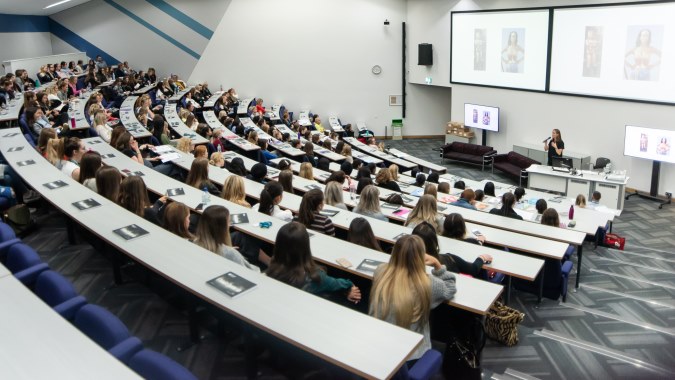Pupils from Bexhill Primary Academy in Sunderland visited global automotive manufacturer Unipres on Friday 20 September as part of a new pilot programme designed to build ambition from an early age.
The North East Ambition: Careers Benchmarks Primary Pilot, managed and delivered by the North East Local Enterprise Partnership and supported by the EY Foundation, is testing how the government’s Good Careers Guidance Benchmarks – eight clearly defined benchmarks for good career guidance – can be adapted for primary schools. It is funded by the European Social Fund.
During the visit, pupils worked alongside apprentices and staff at Unipres to discover more about the jobs they do and what skills they need for each role. They also got to try out some of the company’s state-of-the-art equipment, including its virtual reality crane and virtual reality welder.
Andrew Hodgson, Chair of the North East Local Enterprise Partnership, said: “This visit has been a great opportunity for younger pupils to experience what it might be like to work in the advanced manufacturing and automotive sectors, and I hope it has inspired some ambitious ideas.
“It’s fantastic to see significant regional employers such as Unipres actively involved in supporting the skills development of our young people from the very earliest age, and I am certain that these children will gain a huge amount from what they’ve experienced here today.
“Improving skills, access to employment and supporting career progression is at the heart of the North East Strategic Economic Plan.
“We can help to do that by ensuring young people of every age have meaningful encounters with a broad range of employers; and that they understand the link between the subjects they study in school and the career opportunities available to them. It may sound simple, but it’s a huge culture change for many schools.
“The North East Ambition: Careers Benchmarks Primary Pilot is part of our commitment to improve social mobility by supporting age-appropriate careers-related experiences from primary age.
“The pilot is about exploring how we offer young pupils consistently high-quality, careers-related learning that will spark curiosity, self-belief and hope for the future. Today’s event is an excellent example of just that.”
A total of 70 primary schools from across the North East LEP area are involved in the pilot. Each school has the support of a Facilitator to help them implement and achieve the benchmarks and an Action Researcher to capture the impact.
They can also access seed funding, provided by the EY Foundation, to help finance careers activities in or out of school.
The schools also get to be part of a community of Primary Careers Leaders, helping to deliver a shared vision for achieving the primary benchmarks.
Sian Browne from the EY Foundation said: “Research shows that decisions made at primary age can impact future work opportunities. So, raising awareness at an early stage about the employment options available is crucial. That is why the EY Foundation is delighted to be working with the North East Local Enterprise Partnership as they begin their pilot to develop and embed career-enabling benchmarks in primary schools. We hope these benchmarks will be rolled out across the primary sector, better preparing all pupils for the next stage of career and employment support at secondary school.”
The Careers Benchmarks Primary Pilot follows the North East LEP’s successful delivery of the Gatsby Careers Guidance Benchmark Pilot in 2015, which led to government launching new statutory guidance for schools on how to deliver careers education.
Maureen Askew, Unipres Training Academy Senior Controller, said: “It’s fantastic to welcome the pupils from Bexhill Academy to Unipres so they can discover what the engineering and manufacturing sector is really like, gaining an insight into the variety of exciting careers we offer.
“We believe it is essential that companies like ours from across the region work directly with schools to demystify industry, capture the imagination of these young people and show how the automotive industry remains a vibrant and vital sector in the North East.
“Unipres is absolutely committed to working with schools to support the Career Benchmarks agenda and help excite pupils about engineering and the many other opportunities on their doorstep.”
Laura Carr, Year Six teacher and careers lead at Bexhill Primary Academy, added: “We were keen to take part in the Benchmarks Primary Pilot as it is going to really help us to structure and build on the work we’re already doing in school around careers and skills.
“It’s been fantastic to visit Unipres today and the pupils have learned so much about the work that happens here, from accountancy to engineering, and the skills you need to do those jobs.
“Hands-on learning opportunities like this really excite and inspire the pupils, and I know they’ve all really enjoyed today’s visit, as well as gained a huge amount.”
Year Six pupil, Molly, said: “Today has been really exciting and I’ve learned all about the different kinds of jobs you can do here. The shop floor was the best bit, with the big machines. You could see everyone was working really hard.”
The North East Ambition: Careers Benchmarks Primary Pilot is delivered in partnership with EY Foundation, an independent charity that helps young people overcome barriers to gaining fulfilling employment.
In 2016, the EY Foundation and the Chartered Management Institute (CMI) undertook research with 1500 young people about the challenges of getting into work in the 21st century. This identified the need for interventions at primary school age to develop employability skills and forge links with employers to better prepare young people for the world of work. Building on the success of new career guidance benchmarks for secondary schools (following a two-year pilot by the North East LEP and the Gatsby Foundation), the EY Foundation believes these benchmarks need to be adapted to the primary sector to enable a seamless transition from primary through to secondary education. The EY Foundation believes the pilot project in 70 primary schools across the North East is critical step towards achieving this. For more information visit www.eyfoundation.com.
The visit was brokered by EngineeringUK, who matched the school with Unipres. EngineeringUK is a not-for-profit organisation which works in partnership with the engineering community to inspire tomorrow’s engineers and increase the talent pipeline into engineering. Unipres works closely with EngineeringUK across the year to develop and promote work experience and skills development opportunities for local pupils. For more information visit www.engineeringuk.com.
For more information about the work the North East Local Enterprise Partnership is doing to improve skills and the quality of careers education in the region, visit www.northeastambition.co.uk.







